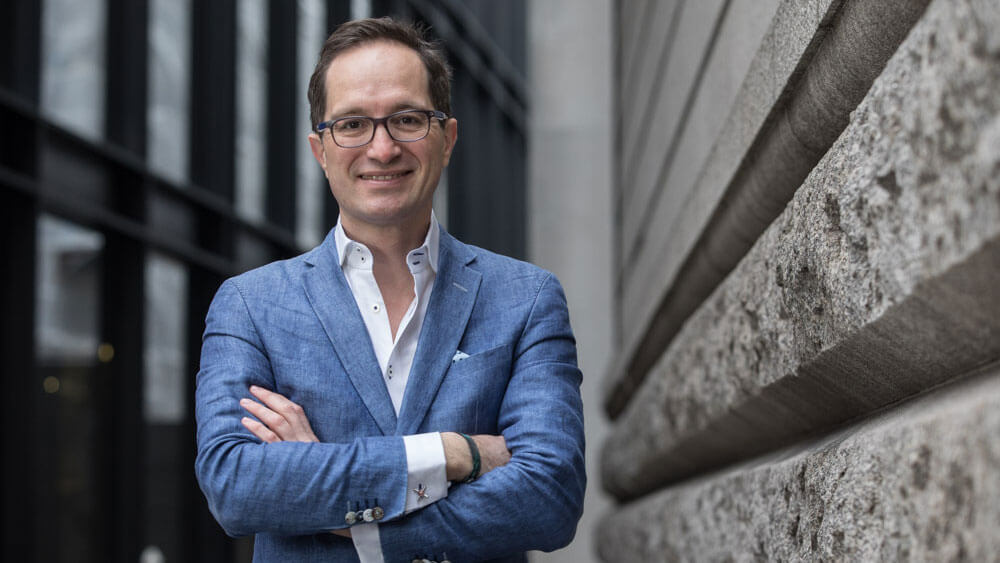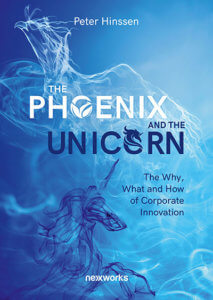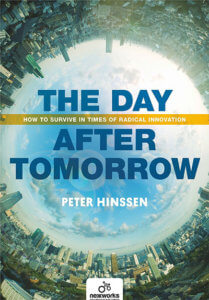
“Most of us passed the 2020 Digital Stress Test, but not everybody got an A+,” said entrepreneur, advisor, business author, and thought leader on radical innovation Peter Hinssen, who speaks at Convening Leaders Jan. 14.
When Convene spoke with Convening Leaders presenter Peter Hinssen via Zoom, he was calling in from an old church that he purchased in Belgium in 2019 to house his large collection of Apple products. “This was really intended to be my little private shrine to Apple,” said Hinssen, an entrepreneur, advisor, business author, and thought leader on radical innovation. But since March, he added, the Apple tabernacle “has become almost my full-time streaming studio.”
Hinssen’s passion for technology and innovation is evident in his recently published fifth book, The Phoenix and the Unicorn: The Why, What and How of Corporate Innovation — which focuses on how traditional businesses can find ways to reinvent themselves. He shared what he plans on discussing during his Main Stage presentation on Thursday, Jan. 14, including the reinvention of the business events industry.
 Tell us what Convening Leaders audiences can expect to hear from you.
Tell us what Convening Leaders audiences can expect to hear from you.
What I’d love to do is basically talk about the content that I typically talk with for traditional companies, but then try to apply that to this particular audience…. I wrote a book 10 years ago called The New Normal, which is now an overused phrase, but it was really about what happens in a world where digital stops being special and just becomes normal. And I think this is what we saw pan out in the last 10 years. I’m now talking a lot about what I call the “never normal,” which is an environment where things are constantly changing and triggered by what I call seismic shocks. They could be technological or biological or ecological, even social or geopolitical, but a lot of these changes — and I think these shocks — are not going to die down. I think they’re even going to intensify.
This sounds really scary, but I think this is actually a set of opportunities because every single one of those seismic shocks actually triggers things. It sets things in motion — whether that’s consumer behavior changing or work dynamics or capacity and resources, or financials. And I believe that the trick of companies is to be fluent and agile enough to pick that up and then leverage that. So the “never normal” is the background [for my talk].
In the last 10 years, it was very fashionable to talk about the new kids on the block and the unicorns that grow so quickly. I was getting a little tired of all these conferences where everybody’s talking about Airbnb and Uber, and you could see that they are interesting stories, but people said, “So what? I’m not Airbnb. I’m not Uber. I mean, why can’t I do that?” So just before the pandemic hit, I came out with a book called The Phoenix and the Unicorn, and this was a reflection to say, “Okay, we’ve had the unicorns, but what about phoenixes?” — [those are] traditional businesses in traditional markets [discovering] how can they reinvent themselves.
What has happened [in 2020] is probably the biggest seismic shift that has happened to [the meetings industry] ever. But we are going to have to reinvent ourselves. I mean, there’s no point in crying over spilled milk and hoping it’s going to go back to the old normal as quickly as possible. I think it’s the necessity for this industry to reinvent itself for that “never normal.”
 In 2017, you published The Day After Tomorrow: How to Survive in Times of Radical Innovation. How can people and organizations plan for “the day after tomorrow” when COVID-19 has made our future so uncertain?
In 2017, you published The Day After Tomorrow: How to Survive in Times of Radical Innovation. How can people and organizations plan for “the day after tomorrow” when COVID-19 has made our future so uncertain?
You can think about the technological or structural side of innovation. I mean, you have to have certain [plans] in place, but what is most important is actually mindset and culture. It’s important to convince your organization that it’s okay to actually try things and take risks. … We need to build organizations that have that psychological safety built in. And one of the strange things is that there’s a very clear link there with cognitive diversity. If you put the same people with the same background and the same MBA in the same room to come up with the same ideas, duh! But if you can actually build in that cognitive diversity, you can foster that idea of psychological safety. And I think that’s the mindset that you need to actually get organizations ready for — that “never normal.”
What’s your take on our collective shift in technology use?
What has been very interesting in 2020 is that all of a sudden everybody was pulled into [what I call] the 2020 Digital Stress Test. I mean, everybody had to figure out how they were going to reinvent themselves where digital was the only option. A great example was the Democratic National Convention of 2020, which was virtual only. Normally, you would have a big stadium with a lot of people and huge AV special effects and everything. And now you have to figure out, can you still relay that same type of empathy and engagement in a virtual environment?
It’s been a huge learning curve. I mean, most of us passed the 2020 Digital Stress Test, but not everybody got an A+. As a matter of fact, I’ve seen some absolutely wonderful things and I’ve seen some absolutely horrible things. And I think what was very interesting as you saw almost different cultures coming together. For example, the classic audiovisual crews and technologies, and then the streaming and platform technologies were touching each other, and then they were colliding.
You have a lot of experience speaking at conferences. How do you see the pandemic changing the nature of business events in the long-term?
Fundamentally, we’re probably going to have virtual meetings and events dominate the bigger part of 2021. I think there are going to be two elements that we have to take into account. One is that once we are allowed again to have physical, live, face-to-face meetings, I think we’re going to appreciate that even more. The irony is that in a world where digital is the normal, our appreciation for human interaction is just going through the roof. I think “human” is going to have a premium added to it. The moment that we’re capable of bringing that back, we’re going to see that premium of physical interaction actually make a really big mark.
The second thing that I would say is that I do believe digital will always be a big component now of anything that we have to think about. That idea of hybrid is a very sticky concept — the fact that whatever we do, we’re going to have to factor in a “what-if” scenario, but also a lot of people are not going to want to do the tiresome travel or [experience] the difficulty of spending so much focus time together. There’s going to be a lot of the flexibility that we’ve not gotten used to, that we will need to offer in some sort of a hybrid setting.
Casey Gale is associate editor at Convene. This interview has been edited and condensed.

